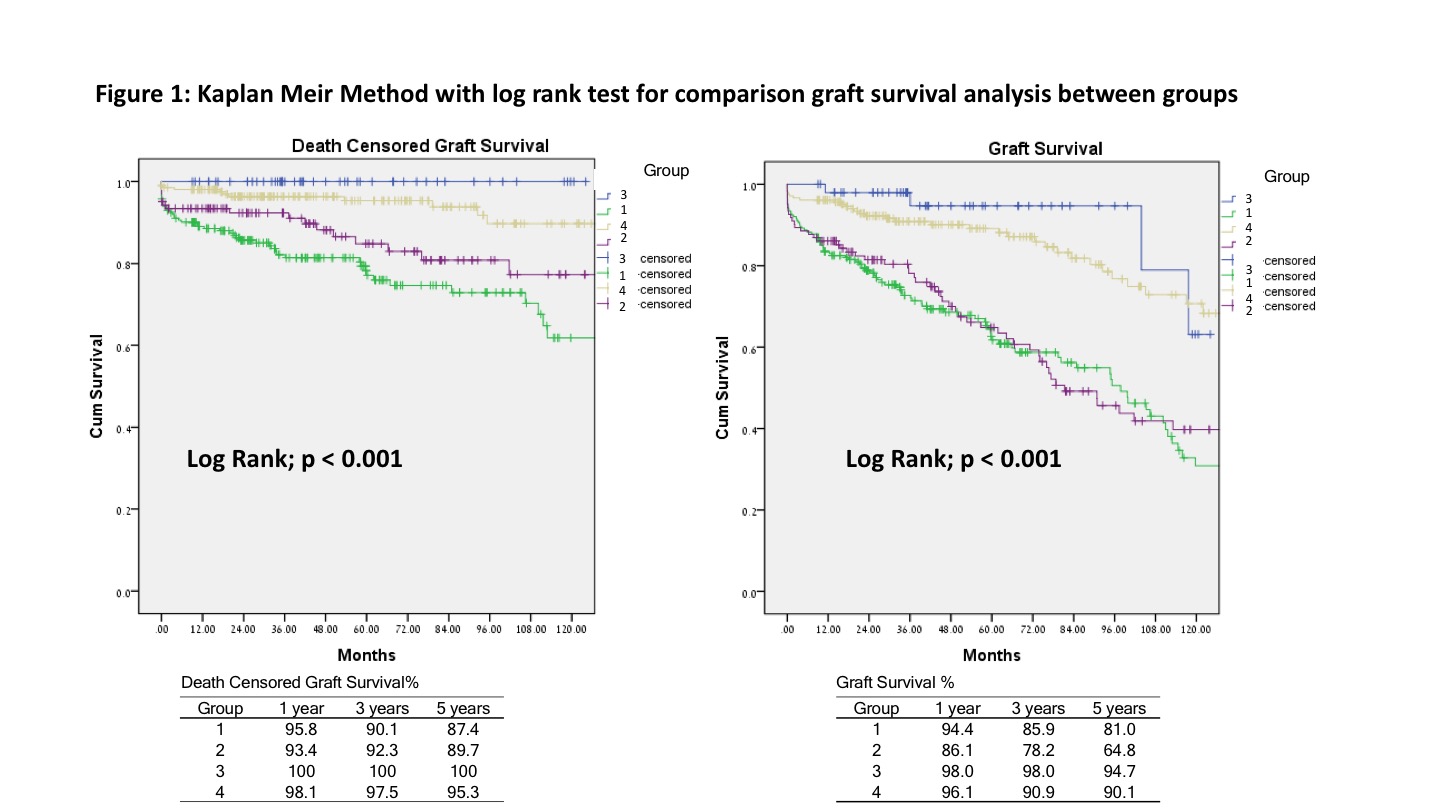Outcomes of Renal Transplantation in Elderly Patients Older Than 60 Years of Age
1Department of Surgery, Assuta Ashdod Medical Center, Ashdod, Israel, 2Department of Transplant Surgery, Beilinson Medical Center, Petach-Tikva, Israel, 3Department of Nephrology, Beilinson Medical Center, Petach-Tikva, Israel
Meeting: 2019 American Transplant Congress
Abstract number: B173
Keywords: Age factors, Kidney transplantation, Outcome
Session Information
Session Name: Poster Session B: Kidney Donor Selection / Management Issues
Session Type: Poster Session
Date: Sunday, June 2, 2019
Session Time: 6:00pm-7:00pm
 Presentation Time: 6:00pm-7:00pm
Presentation Time: 6:00pm-7:00pm
Location: Hall C & D
*Purpose: Patients ≥ 60 years are the largest growing age group which comprise 40% of all patients with ESRD. Kidney transplantation has been shown to be associated with improved survival and quality of life compared to remaining on dialysis in all ages. Nevertheless, the individual benefit of transplanting elderly patients has to be balanced in terms of utility consideration with the growing organ shortage. The Israeli Transplantation Center function under the Israeli ministry of health approved in 1999 the “old to old” program for kidney transplantation. We aimed to study the 17-years results of transplantation in this age group at our center and compare those to the results of live donor transplant in the same age group and further analysis according to donor age < or < 60 years.
*Methods: We analyzed graft and patient survival in a retrospective cohort of 593 kidney transplants recipients > 60 yr. between 2000-2017. Four study groups were analyzed; group 1 (n=213) – old recipients & old deceased donors (the group of “old to old” program), group 2 (n=122) – old recipients & young deceased donors. Group 3 (n=51) old (> 60 years) recipients & old living donors, group 4 (n=207) – old recipients & young living donors, we also looked at rate of delayed graft function (DGF) and performed Cox regression for the whole cohort looking at risk factors for graft loss.
*Results: Five-years uncensored deceased donor graft survival rates were 81.0% and 64.8% in group 1 and 2, respectively, (p=ns), and 94.7% vs. 90.1% (p=0.314) in groups 3 and 4 (living-donor), respectively. Five-years patient survival rates were 87.3% in group 1 and 77.1% in group 2 (p=ns), and 94.7% vs. 92.1% (p=ns) in groups 3 and 4, respectively. The occurrence of DGF was found to be higher (p<0.001) in groups 1 and 2 (41% and 48%, respectively) compared with groups 3 and 4 (16% and 29%, respectively). In Cox regression age (OR=1.042), DM (1.43), IHD (OR=1.689), deceased donor (OR=2.403) and ATN (OR=2.272) were found to be risk factors for graft loss.
*Conclusions: Kidney transplantation for old recipients has comparable results of graft and patient survival when comparing old and young donors. Results of live donor transplantation in this age group are significantly better. Nevertheless, from utility considerations our results support the “old to old” program for kidney transplantation with the advantage of maximizing the use of “marginal” kidneys for aged recipients.
To cite this abstract in AMA style:
Yemini R, Nesher E, Rahamimov R, Eizner S, Mazhybovsky V, Tennak V, Gurevich M, Ghinea R, Mor E. Outcomes of Renal Transplantation in Elderly Patients Older Than 60 Years of Age [abstract]. Am J Transplant. 2019; 19 (suppl 3). https://atcmeetingabstracts.com/abstract/outcomes-of-renal-transplantation-in-elderly-patients-older-than-60-years-of-age/. Accessed March 2, 2026.« Back to 2019 American Transplant Congress

